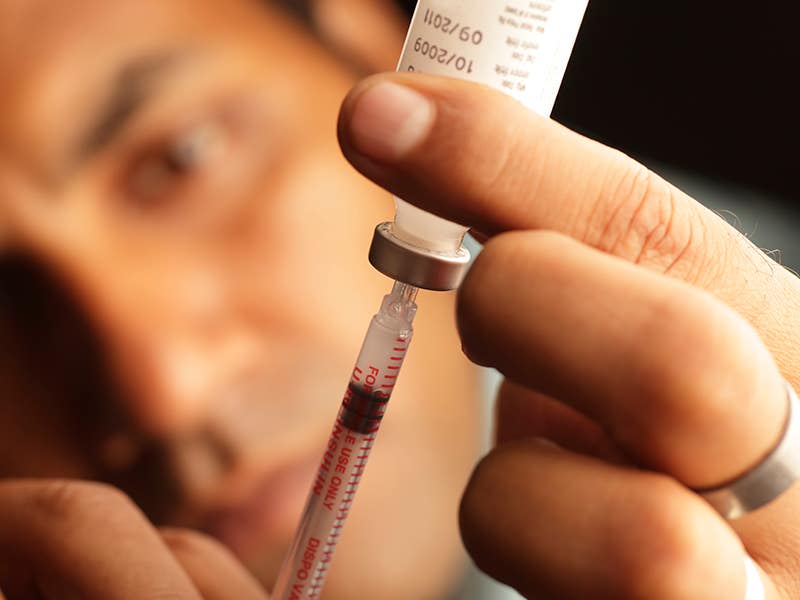Once-weekly insulin as effective as daily injections for patients with type 2 diabetes
New research shows that a once-weekly insulin injection is just as effective as daily insulin for managing blood sugar in people with type 2 diabetes.

For many patients with type 2 diabetes, insulin becomes a necessary addition to their treatment plan when oral medications alone fail to control their blood sugar. (CREDIT: CC BY-SA 3.0)
A new study highlights promising results for a once-weekly insulin injection in managing blood sugar levels for people with type 2 diabetes.
This research, published in the New England Journal of Medicine (NEJM) and presented at the Annual Meeting of the European Association for the Study of Diabetes (EASD), found that insulin efsitora alfa (efsitora) is just as effective and safe as traditional daily insulin injections, such as insulin degludec, in controlling blood sugar levels. The study was led by Dr. Carol Wysham from the MultiCare Rockwood Center for Diabetes and Endocrinology in Spokane, Washington.
For many patients with type 2 diabetes, insulin becomes a necessary addition to their treatment plan when oral medications alone fail to control their blood sugar. However, daily insulin injections can be challenging for some patients.
Factors like the inconvenience of daily injections, concerns about weight gain, and the fear of hypoglycemic episodes (commonly referred to as "hypos") can make it difficult for people to adhere to their treatment. The potential for a once-weekly insulin injection offers hope for simplifying treatment and improving adherence.
Insulin efsitora alfa is a new basal insulin designed to be administered just once a week. Although early trials on this insulin have been limited to smaller phase 1 or phase 2 studies, this new research marks the first large-scale phase 3 trial comparing efsitora with a commonly used daily insulin, insulin degludec.
The study specifically focused on patients who had not yet started insulin therapy but were struggling to achieve their blood sugar goals despite being on multiple oral diabetes medications.
In this trial, 928 participants were recruited and divided randomly into two groups: one group received once-weekly efsitora, and the other received daily insulin degludec. The primary goal of the study was to measure changes in the patients’ glycated hemoglobin (HbA1c) levels after 52 weeks of treatment.
Related Stories:
HbA1c is an important measure of long-term blood sugar control. The researchers hypothesized that efsitora would be at least as effective as degludec in controlling blood sugar levels.
By the end of the 52-week study, the average HbA1c levels in the efsitora group decreased from 8.21% to 6.97%, showing an absolute reduction of 1.26%. In the degludec group, HbA1c levels dropped from 8.24% to 7.05%, with an absolute reduction of 1.17%. This resulted in a treatment difference of just 0.09%, confirming that efsitora was non-inferior to degludec in reducing HbA1c.
The study also examined secondary outcomes, such as how often participants’ blood sugar levels stayed within the target range of 70 to 180 mg per deciliter during the last four weeks of the study. On average, those using efsitora spent 64.3% of their time in this target range, compared to 61.2% for those using degludec. This difference of 3.1 percentage points was statistically significant, indicating that efsitora may help patients maintain better blood sugar control throughout the day.
Another key aspect of the research was the impact of efsitora on hypoglycemia. Hypoglycemia is a common concern for patients with diabetes, as it can lead to serious complications if blood sugar levels drop too low. In this study, the rate of hypoglycemic events (episodes of dangerously low blood sugar) was 0.58 events per participant per year with efsitora, compared to 0.45 events per participant per year with degludec.
While this suggests that hypoglycemia may occur slightly more often with efsitora, the difference was not statistically significant, and importantly, no severe hypoglycemia occurred in the efsitora group. By contrast, six severe hypoglycemic episodes were reported among those using degludec.
The findings suggest that efsitora offers an effective alternative to daily insulin for controlling blood sugar levels. “In adults with type 2 diabetes who had not previously received insulin, once-weekly efsitora was noninferior to once-daily degludec in controlling high blood sugar by reducing glycated hemoglobin levels,” said the authors of the study. This supports the idea that efsitora could simplify insulin therapy for patients who struggle with daily injections.
The prospect of a once-weekly insulin injection could remove some of the barriers that prevent people from starting insulin therapy. According to the researchers, “A once-weekly insulin has the potential to simplify dose administration and diminish barriers to starting insulin therapy by means of a reduction in injection burden as compared with a once-daily insulin.” In fact, a recent study exploring patient preferences for insulin therapy found that both patients and healthcare providers favor once-weekly injections over daily ones.
In addition to its potential benefits for people currently using traditional insulin therapy, efsitora may also be compatible with newer treatments, such as glucagon-like peptide-1 (GLP-1) receptor agonists. These medications, which help stimulate insulin production and reduce blood sugar levels, are becoming increasingly popular in the treatment of type 2 diabetes. In this study, efsitora was shown to be just as effective as degludec in lowering HbA1c levels for patients who were also using GLP-1 receptor agonists.
The researchers emphasized the importance of this finding, given the growing use of GLP-1 receptor agonists in diabetes treatment. They explained, “Given treatment guidelines and recommendations to incorporate GLP-1 receptor agonists earlier in treatment, along with their growing use worldwide, it is relevant to show that efsitora can be effectively and safely added to such therapy.” The results suggest that combining efsitora with GLP-1 receptor agonists does not significantly increase the risk of hypoglycemia, further enhancing its potential as a treatment option.
Overall, this study demonstrates that efsitora offers a safe, effective, and convenient alternative to daily insulin injections for adults with type 2 diabetes. With the potential to simplify insulin therapy and improve adherence, efsitora may represent a significant advancement in the management of type 2 diabetes.
Note: Materials provided above by The Brighter Side of News. Content may be edited for style and length.
Like these kind of feel good stories? Get The Brighter Side of News' newsletter.
Joshua Shavit
Science & Technology Writer | AI and Robotics Reporter
Joshua Shavit is a Los Angeles-based science and technology writer with a passion for exploring the breakthroughs shaping the future. As a contributor to The Brighter Side of News, he focuses on positive and transformative advancements in AI, technology, physics, engineering, robotics and space science. Joshua is currently working towards a Bachelor of Science in Business Administration at the University of California, Berkeley. He combines his academic background with a talent for storytelling, making complex scientific discoveries engaging and accessible. His work highlights the innovators behind the ideas, bringing readers closer to the people driving progress.



